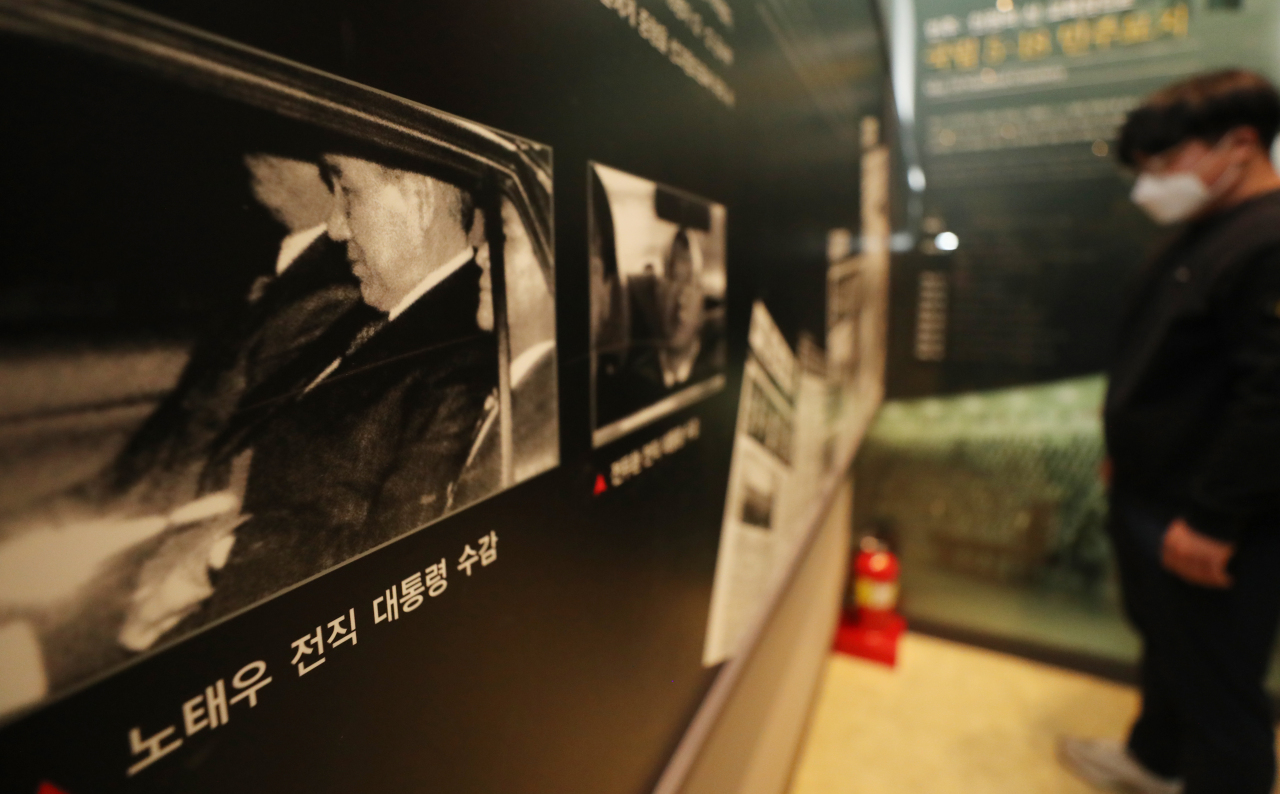
The news of former President Roh Tae-woo’s death on Tuesday was met with mixed reactions.
The ruling Democratic Party of Korea expressed condolences, but also pointed to his part in military regimes.
Saying that the party wishes for Roh to rest in peace, Democratic Party spokesperson Rep. Lee Yong-bin said the late ex-president extended military rule despite being elected democratically, and that he was a “criminal in history” for his part in crushing the 1980 Gwangju Democratic Uprising.
Lee, however, said that Roh differed from former President Chun Doo-hwan in having apologized for his actions.
The main opposition People Power Party prayed for Roh’s eternal rest and sent a message of condolences to the bereaved family, promising not to repeat the faults of his political legacy.
The party’s spokesperson Rep. Her Euna took note of Roh’s fulfillment of accepting calls for a direct presidential system with a popular vote in 1987, where he became the first directly elected president in South Korea’s history.
Rep. Her also highly appraised Roh’s historic achievements such as South Korea’s admission to the UN, the signing of the symbolic inter-Korean basic agreement and diplomatic success through “Nordpolitik” during his term.
However, the main opposition party pointed out that Roh’s multitude of faults, including his involvement in the military coup of 1979 and the massacre at the Gwangju Uprising in May of 1980, cannot be glossed over. "Our party will not allow such unfortunate history to repeat,” Rep. Her delivered in a verbal message.
The Korea International Trade Association expressed “deep condolences” over Roh’s death in a written statement issued on behalf of the trade industry.
The KITA credited Roh for laying the foundation for the country’s successful debut and leap onto the international stage surmounting the scars of the 1950-53 Korean War by hosting the Seoul Olympics in 1988.
“We will make efforts to help Korea to take a leap forward on the international stage honoring the achievements of the deceased,” the KITA said, acknowledging Roh’s contribution to lay the groundwork for the “New Northern Policy” pursued by the Moon Jae-in government.
But Roh’s death evoked mixed responses from civic groups established to remember the spirit of victims and participants of the May 18 Gwangju Democratic Uprising.
The May 18 Memorial Foundation expressed regrets that Roh passed away without ever issuing a direct apology or making any confession on the Army’s role in the Gwangju massacre in an interview with the Yonhap News Agency.
The organization said Roh was the key figure in revealing who ordered to open fire at the pro-democracy demonstrators.
The May 18 Memorial Foundation underscored that Roh’s death cannot cover the truth of the May 18 Gwangju Democratic Uprising, pledging to continue to get to the bottom of the massacre.
By Ji Da-gyum (dagyumji@heraldcorp.com)
The ruling Democratic Party of Korea expressed condolences, but also pointed to his part in military regimes.
Saying that the party wishes for Roh to rest in peace, Democratic Party spokesperson Rep. Lee Yong-bin said the late ex-president extended military rule despite being elected democratically, and that he was a “criminal in history” for his part in crushing the 1980 Gwangju Democratic Uprising.
Lee, however, said that Roh differed from former President Chun Doo-hwan in having apologized for his actions.
The main opposition People Power Party prayed for Roh’s eternal rest and sent a message of condolences to the bereaved family, promising not to repeat the faults of his political legacy.
The party’s spokesperson Rep. Her Euna took note of Roh’s fulfillment of accepting calls for a direct presidential system with a popular vote in 1987, where he became the first directly elected president in South Korea’s history.
Rep. Her also highly appraised Roh’s historic achievements such as South Korea’s admission to the UN, the signing of the symbolic inter-Korean basic agreement and diplomatic success through “Nordpolitik” during his term.
However, the main opposition party pointed out that Roh’s multitude of faults, including his involvement in the military coup of 1979 and the massacre at the Gwangju Uprising in May of 1980, cannot be glossed over. "Our party will not allow such unfortunate history to repeat,” Rep. Her delivered in a verbal message.
The Korea International Trade Association expressed “deep condolences” over Roh’s death in a written statement issued on behalf of the trade industry.
The KITA credited Roh for laying the foundation for the country’s successful debut and leap onto the international stage surmounting the scars of the 1950-53 Korean War by hosting the Seoul Olympics in 1988.
“We will make efforts to help Korea to take a leap forward on the international stage honoring the achievements of the deceased,” the KITA said, acknowledging Roh’s contribution to lay the groundwork for the “New Northern Policy” pursued by the Moon Jae-in government.
But Roh’s death evoked mixed responses from civic groups established to remember the spirit of victims and participants of the May 18 Gwangju Democratic Uprising.
The May 18 Memorial Foundation expressed regrets that Roh passed away without ever issuing a direct apology or making any confession on the Army’s role in the Gwangju massacre in an interview with the Yonhap News Agency.
The organization said Roh was the key figure in revealing who ordered to open fire at the pro-democracy demonstrators.
The May 18 Memorial Foundation underscored that Roh’s death cannot cover the truth of the May 18 Gwangju Democratic Uprising, pledging to continue to get to the bottom of the massacre.
By Ji Da-gyum (dagyumji@heraldcorp.com)


![[Exclusive] Korean military set to ban iPhones over 'security' concerns](http://res.heraldm.com/phpwas/restmb_idxmake.php?idx=644&simg=/content/image/2024/04/23/20240423050599_0.jpg&u=20240423183955)




![[Pressure points] Leggings in public: Fashion statement or social faux pas?](http://res.heraldm.com/phpwas/restmb_idxmake.php?idx=644&simg=/content/image/2024/04/23/20240423050669_0.jpg&u=)

![[Herald Interview] 'Amid aging population, Korea to invite more young professionals from overseas'](http://res.heraldm.com/phpwas/restmb_idxmake.php?idx=644&simg=/content/image/2024/04/24/20240424050844_0.jpg&u=20240424200058)









